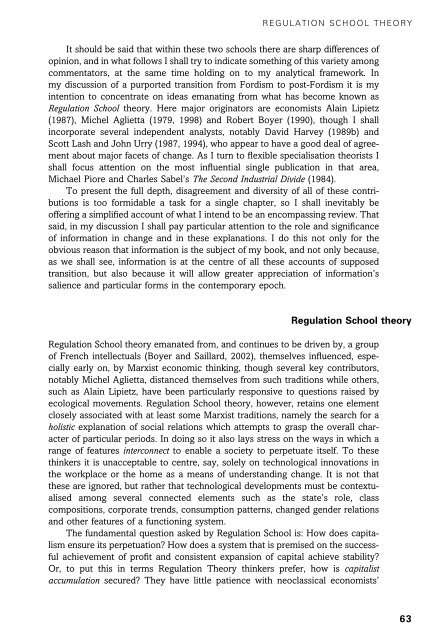Theories of the Information Society, Third Edition - Cryptome
Theories of the Information Society, Third Edition - Cryptome
Theories of the Information Society, Third Edition - Cryptome
Create successful ePaper yourself
Turn your PDF publications into a flip-book with our unique Google optimized e-Paper software.
REGULATION SCHOOL THEORY<br />
1<br />
1<br />
1<br />
2<br />
It should be said that within <strong>the</strong>se two schools <strong>the</strong>re are sharp differences <strong>of</strong><br />
opinion, and in what follows I shall try to indicate something <strong>of</strong> this variety among<br />
commentators, at <strong>the</strong> same time holding on to my analytical framework. In<br />
my discussion <strong>of</strong> a purported transition from Fordism to post-Fordism it is my<br />
intention to concentrate on ideas emanating from what has become known as<br />
Regulation School <strong>the</strong>ory. Here major originators are economists Alain Lipietz<br />
(1987), Michel Aglietta (1979, 1998) and Robert Boyer (1990), though I shall<br />
incorporate several independent analysts, notably David Harvey (1989b) and<br />
Scott Lash and John Urry (1987, 1994), who appear to have a good deal <strong>of</strong> agreement<br />
about major facets <strong>of</strong> change. As I turn to flexible specialisation <strong>the</strong>orists I<br />
shall focus attention on <strong>the</strong> most influential single publication in that area,<br />
Michael Piore and Charles Sabel’s The Second Industrial Divide (1984).<br />
To present <strong>the</strong> full depth, disagreement and diversity <strong>of</strong> all <strong>of</strong> <strong>the</strong>se contributions<br />
is too formidable a task for a single chapter, so I shall inevitably be<br />
<strong>of</strong>fering a simplified account <strong>of</strong> what I intend to be an encompassing review. That<br />
said, in my discussion I shall pay particular attention to <strong>the</strong> role and significance<br />
<strong>of</strong> information in change and in <strong>the</strong>se explanations. I do this not only for <strong>the</strong><br />
obvious reason that information is <strong>the</strong> subject <strong>of</strong> my book, and not only because,<br />
as we shall see, information is at <strong>the</strong> centre <strong>of</strong> all <strong>the</strong>se accounts <strong>of</strong> supposed<br />
transition, but also because it will allow greater appreciation <strong>of</strong> information’s<br />
salience and particular forms in <strong>the</strong> contemporary epoch.<br />
Regulation School <strong>the</strong>ory<br />
1<br />
1<br />
Regulation School <strong>the</strong>ory emanated from, and continues to be driven by, a group<br />
<strong>of</strong> French intellectuals (Boyer and Saillard, 2002), <strong>the</strong>mselves influenced, especially<br />
early on, by Marxist economic thinking, though several key contributors,<br />
notably Michel Aglietta, distanced <strong>the</strong>mselves from such traditions while o<strong>the</strong>rs,<br />
such as Alain Lipietz, have been particularly responsive to questions raised by<br />
ecological movements. Regulation School <strong>the</strong>ory, however, retains one element<br />
closely associated with at least some Marxist traditions, namely <strong>the</strong> search for a<br />
holistic explanation <strong>of</strong> social relations which attempts to grasp <strong>the</strong> overall character<br />
<strong>of</strong> particular periods. In doing so it also lays stress on <strong>the</strong> ways in which a<br />
range <strong>of</strong> features interconnect to enable a society to perpetuate itself. To <strong>the</strong>se<br />
thinkers it is unacceptable to centre, say, solely on technological innovations in<br />
<strong>the</strong> workplace or <strong>the</strong> home as a means <strong>of</strong> understanding change. It is not that<br />
<strong>the</strong>se are ignored, but ra<strong>the</strong>r that technological developments must be contextualised<br />
among several connected elements such as <strong>the</strong> state’s role, class<br />
compositions, corporate trends, consumption patterns, changed gender relations<br />
and o<strong>the</strong>r features <strong>of</strong> a functioning system.<br />
The fundamental question asked by Regulation School is: How does capitalism<br />
ensure its perpetuation? How does a system that is premised on <strong>the</strong> successful<br />
achievement <strong>of</strong> pr<strong>of</strong>it and consistent expansion <strong>of</strong> capital achieve stability?<br />
Or, to put this in terms Regulation Theory thinkers prefer, how is capitalist<br />
accumulation secured? They have little patience with neoclassical economists’<br />
63
















